The last two days have taken me up into the mountains, a pleasant break from the freezing temperatures in Glenview, north of Chicago, where my wife and I spent last week end.
Ed and I walked in the Gordon Hirayabashi camp ground. As soon as we parked the car we noticed a plant that looked, from a distance, like a bladderpod, though we knew that it does not normally grow at this elevation. On closer look the “flowers” were actually leaves. Looking still closer we saw that these leaves at the tips of the branches were covered with yellow papillae. We have no idea what the plant is. From the woody stem, we decided it must be a perennial. We will enjoy checking on it from time to time to see how it develops.
The mystery plant, seemingly in flower
The mystery plant showing that these are leaves, not flowers
A close up of the plant showing the yellow papillae
We had almost given up on seeing any flowers on our return journey when we heard a loud buzzing coming from the top of some of the cottonwood trees. These were the male trees, with their golden catkins. Some of the trees still had leaves left over from last fall. All of them had leaf buds developing at the end of the twigs.
We stopped for a snack by a little waterfall. It was actually running, though very slowly. We have had precious little rain this winter. There we noticed that the Alligator juniper (Juniperus deppeana) was coming into flower. They are not true flowers, but thousands of little brown buds containing pollen. They are called pollen cones. I managed to get a close-up of one of them, and also of new fruit forming. It is red now but will turn blue as it ripens.
The Alligator Juniper pollen cones
New fruit on the Alligator Juniper
The next day Dave and I went to Bear Canyon and found that the great Arizona cypress trees (Cupressus arizonica) were also coming into flower. I managed to get a close up of the pollen cones, including some that evidently had finished releasing their pollen. Then for the first time Dave found what seems to be a seed cone (the female part of the plant.) 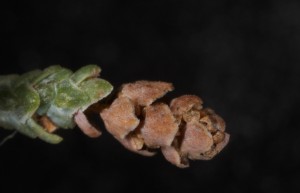
Arizona cypress pollen cone
We think this might be the female, seed cone of the Arizona Cypress
Dropping down into the canyon we came across a large dried up plant which we think was a Pokeberry (Phytolacca icosandra). It had lots of last year’s fruit on it. The ones on the tips of the branches were deep red. Lower down they were grey and white. I love the close-up pictures we were able to get.
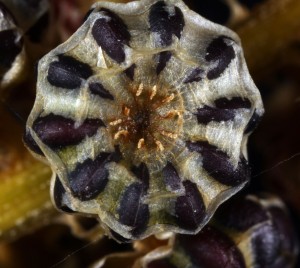 Last year’s fruit on the Pokeberry
Last year’s fruit on the Pokeberry
Lower down the stalk the old fruit turns grey
We also saw lots of willow in bloom, possibly Coyote willow (Salix exigua). It seemed much too early in the year, but the bees certainly knew that it was in flower. This is another dioecious plant. With my new close-up camera I was not only able to look more deeply at the male flowers, but for the first time, saw the actual flowers on the female shrubs. They are the tiny pale yellow endings to the green spikes.
The male flowers of the willow
A close-up showing the actual tiny flowers on the willow
Tomorrow (Feb. 1st) Owen and I have the opening of our Father/Son art show at Contreras Gallery in Tucson – 6 – 9 pm. All are welcome. The show goes until Feb. 22.

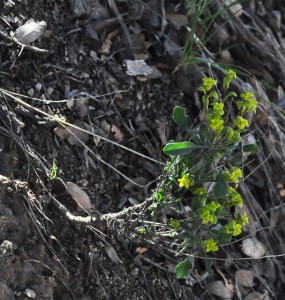
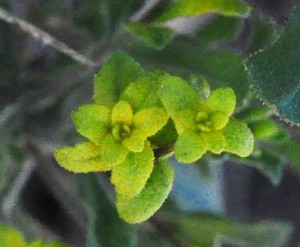
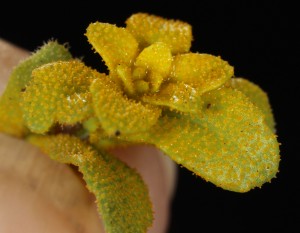
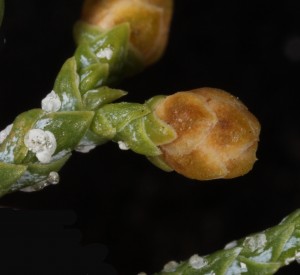
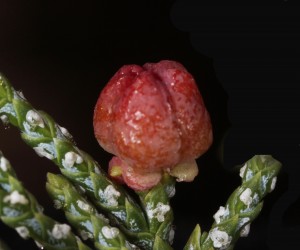
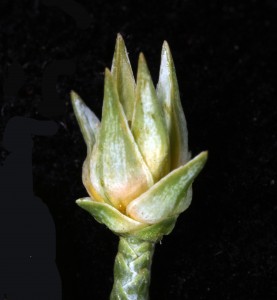
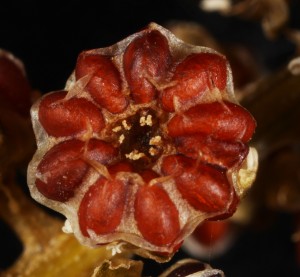
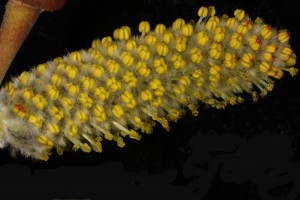
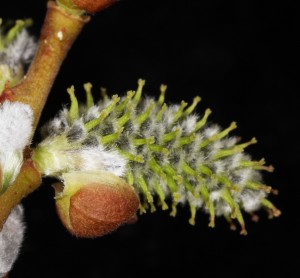
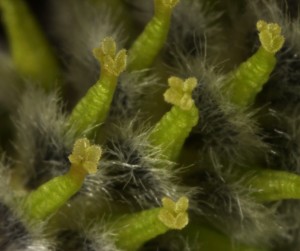
I love these photos of the tiny flowers that are most often overlooked. How lovely is God’s creation from the smallest to the largest!! Bless you for bringing these beauties out for all of us to see.
Christa
Thank you, Uncle Frank, for sharing these beautiful realities. It is wonderful to slow down and take a trip out West. Sending love to you & Louise
Those yellow flowers look like Boechera (formerly Arabis) or some related mustard family plant infected by the fungus Puccinia monoica.
Thank you – I will keep an eye out for that.
Hi Frank
good to see that you and Louise are still active.
I have been looking at your books and also at your blog. Just wonderful. Keep it up.
You are doing for Arizona what I have long wanted to do in here, in the Canberra region of Australia.
do let me have your email address and I will be in touch and send you a few of my close ups of Australian flowers. I do a lot of hiking, exploring. And can tell you more a bout it. I love taking close ups of flowers and insects.
Best wishes
Barrie
Hi Barrie:
Thanks for the encouragement. I am fuzrose@sunrisechapel.org. I look forward to seeing your photographs.
all good wishes
Frank